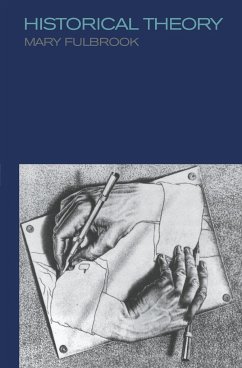 Even if one claims one is not following any theory, one cannot help following one. Hence, it is much better to acknowledge it, unless one wants to be under the influence of an implicit (and hence, far more dangerous) paradigm.
Even if one claims one is not following any theory, one cannot help following one. Hence, it is much better to acknowledge it, unless one wants to be under the influence of an implicit (and hence, far more dangerous) paradigm.This is what Mary Fulbrook (chapter 3 of her 20o2 book, see photo) says about implicit paradigms in history:
A-theoretical historians, if provoked sufficiently, may be brought to enunciate the view that Theory Is Not History and historians should get on with The Real Job of Doing History. Now for the bad news.
Even those who have no interest in theory are actually operating with implicit paradigms. In fact, the rest of this book is devoted to unpicking the various elements involved even in implicit paradigms. We have just introduced some of these elements, which, if unpacked a little more, include: the constitution and categorisation of "facts"; the selection of which "facts" to include and exclude; notions about the relationship among elements; the significance and weighting given to each element; the constitution of what might be called a Geschichtsbild, the historical picture of the whole, and the emplotment, the tale told about the combination of selected elements (sometimes called the metanarrative); and the general evaluation and emotive colouring given to the final product, the representation of history (including the use of language through which to write and represent selected aspects and interpretations of the past). […]
For example, how should one approch characterization and explanation of the English Civil War —or English Revolution, as Marxit historians (used to) like to call it? […]
[I]t is important to note the fact that any historical explanation entails choices about selection and explanation, whether or not it is considered by its proponents to be theoretical. And what satisfies one historian's curiosity (analysis of key meetings, the specific motives or actions of particular individuals) may seem just a matter of irritating or even trivial detail from the perspective of another historian. (pp.35-37)
(By the way, the present writer never doubted the fact that it WAS a Revolution. Apparently, my History teachers were also influenced by Marxist paradigms but, helas, did not make me aware of them.)
Let us then speak about methodology, all the more because it is something were genuine discussions are really possible (unlike in the case of minor details of one's work).
I already addressed this issue here and D. Wujastyk did it in his comment on this post.

No comments:
Post a Comment